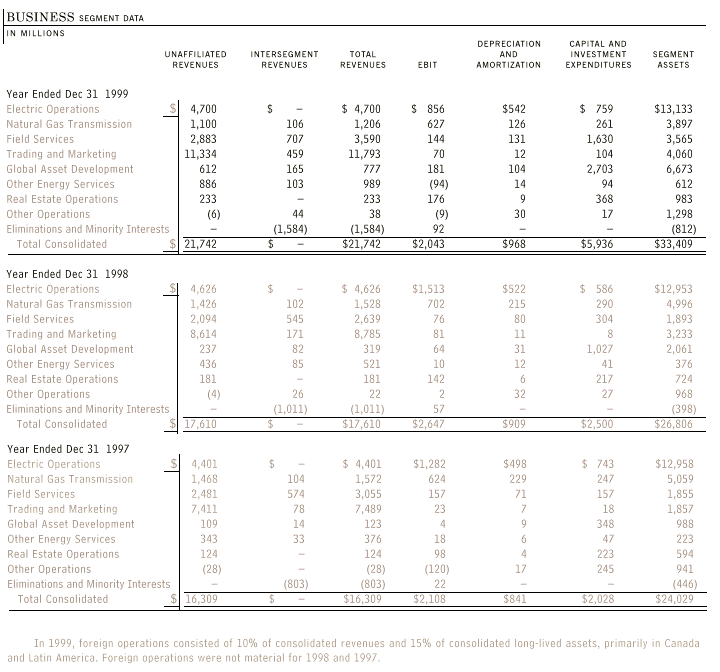
3- BUSINESS SEGMENTSDuke Energy is an integrated energy and energy services provider with the ability to offer physical delivery and management of both electricity and natural gas throughout the U.S. and abroad. Duke Energy provides these and other services through seven business segments: Electric Operations, Natural Gas Transmission, Field Services, Trading and Marketing, Global Asset Development, Other Energy Services and Real Estate Operations.
Electric Operations generates, transmits, distributes and sells electric energy in central and western North Carolina and the western portion of South Carolina (doing business as Duke Power or Nantahala Power and Light). These electric operations are subject to the rules and regulations of the FERC, the North Carolina Utilities Commission (NCUC) and the Public Service Commission of South Carolina (PSCSC).
Natural Gas Transmission provides interstate transportation and storage of natural gas for customers primarily in the Mid-Atlantic and New England states. Until the sale of the Midwest Pipelines on March 29, 1999, Natural Gas Transmission also provided interstate transportation and storage services in the midwest states. See further discussion of the sale of the Midwest Pipelines in Note 2 to the Consolidated Financial Statements. The interstate natural gas transmission and storage operations are subject to the rules and regulations of the FERC.
Field Services gathers, processes, transports and markets natural gas and produces, transports and markets NGLs. Field Services operates gathering systems in western Canada and ten contiguous states that serve major gas-producing regions in the Rocky Mountain, Permian Basin, Mid-Continent and onshore and offshore Gulf Coast areas.
Trading and Marketing markets natural gas, electricity and other energy-related products across North America. Duke Energy owns a 60% interest in Trading and Marketing's energy trading operations, with Mobil Corporation owning a 40% minority interest. This segment also includes certain other trading activities and limited hydrocarbon exploration and production activities that are wholly owned by Duke Energy.
Global Asset Development develops, owns and operates energy-related facilities worldwide. Global Asset Development conducts its operations primarily through Duke Energy North America, LLC (Duke Energy North America) and Duke Energy International.
Other Energy Services provides engineering, consulting, construction and integrated energy solutions worldwide, primarily through Duke Engineering & Services, Inc., Duke/ Fluor Daniel and DukeSolutions, Inc.
Real Estate Operations conducts its business through Crescent Resources, Inc., which develops high quality commercial and residential real estate projects and manages land holdings in the southeastern U.S.
Duke Energy's reportable segments are strategic business units that offer different products and services and are each managed separately. The accounting policies for the segments are the same as those described in Note 1 to the Consolidated Financial Statements. Management evaluates segment performance based on earnings before interest and taxes (EBIT) after deducting minority interests. EBIT presented in the accompanying table includes intersegment sales accounted for at prices representative of unaffiliated party transactions. Segment assets are provided as additional information in the accompanying table and are net of intercompany advances, intercompany notes receivable and investments in subsidiaries.
Other Operations primarily includes communication services, water services and certain unallocated corporate items.
